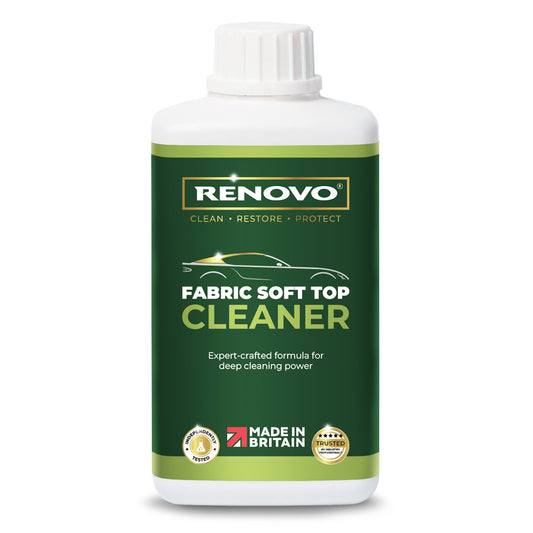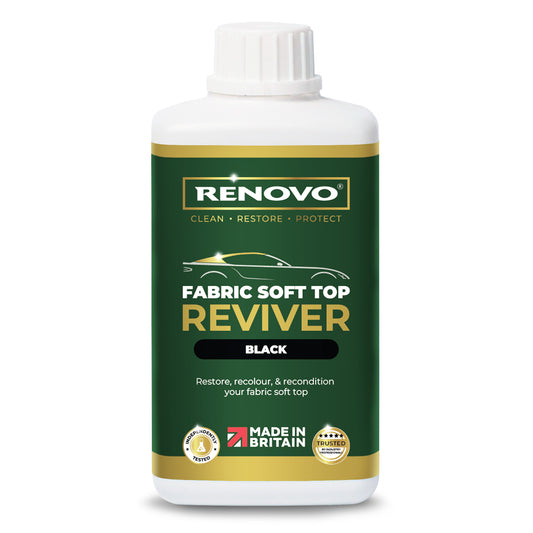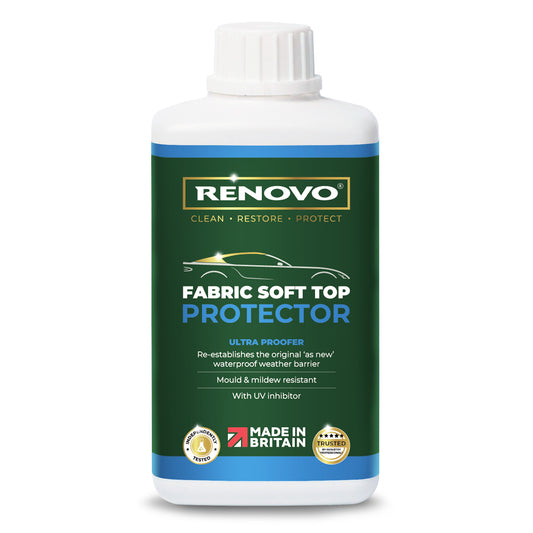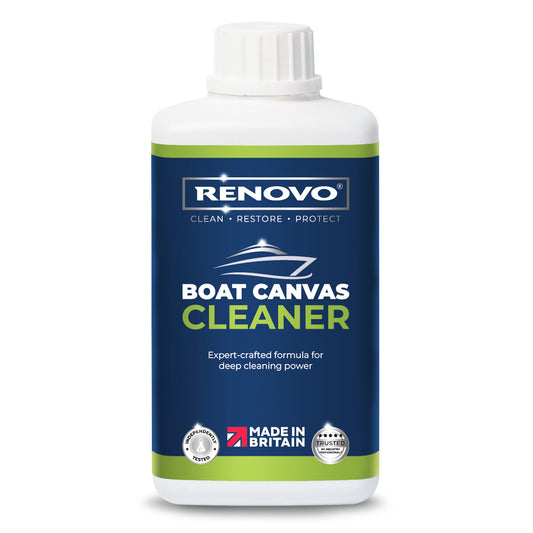It is best to choose a day when the weather is not too hot and the temperature is above freezing, 13-18 degrees Celsius would be ideal. The products should not be applied in direct sunlight or to a boat cover that has been in full sunlight. If the boat cover is hot/warm it should be allowed to cool before commencing application of Renovo products. The boat cover should be allowed to dry in between each application of Renovo products or else residual water remaining in the canvas will dilute the next product. Do not apply Renovo products when wet weather is expected.
Step one: cleaning and preparation
Thoroughly clean the boat cover with Renovo Boat Canvas Cleaner. Removing previous applications of waterproofing products, dust, dirt, mould, mildew and tree sap will provide the best surface for applying Renovo Reviver.
It is imperative that any previously applied waterproofing agents are completely removed, as Reviver, the next stage in the treatment is water based. Hence, if Reviver is applied to a boat cover that has residual waterproofer within, the Reviver is not able to soak through evenly and this will give a patchy result.
To remove Renovo Marine Ultra Proofer use Renovo Boat Canvas Cleaner following these instructions:– Mist spray the cover and then paint on Boat Canvas Cleaner, leave the solution to process for approximately one hour, the optimum time for the active ingredients to work. Using hand hot water the surface should then be scrubbed with a bristle brush, being careful around stitched areas and windows. It is essential to use hand hot water. Finish by rinsing off with water. Repeat the whole process as necessary.
To remove other proprietary branded water proofers it is best to contact the manufacturer’s customer service team to ascertain their best advice. N.B. Check that all waterproofer has been removed by performing this simple test – Simulate a shower of rain, not a soaking/downpour, using a watering can with a rose/sprinkle attachment.
If this simulated shower soaks into the fabric evenly across the whole boat cover then so will Reviver. If you have any doubts about the removal of the waterproofer, perform the cleaning process again, and re-test with the simulated shower.
Continue this process until the boat cover is definitely free of waterproofer!
Step two: reviving the colour
When you are sure that the boat cover is adequately prepared by your cleaning processes, that is all water proofer has been removed and the canvas is as clean as possible you can begin application of Reviver. Renovo Boat Canvas Reviver is manufactured to industry standard Pantone® numbers.
We recommend that to ensure you are happy with the colour result on your boat cover you should check by testing the Reviver on a small inconspicuous area prior to treating the whole soft top.
If you purchase more than one bottle of Reviver to treat the same boat cover, we advise that you shake the bottles well and combine the contents of both bottles in a suitable container (clean paint kettle is ideal) then stir well.
It is imperative that you have sufficient Reviver to complete a full coat of the boat cover in one application, if you run out of Reviver part way through the application you will almost certainly achieve a join line when you start to complete the coat.
As an approximate guide a litre bottle of Reviver will cover about 5 sq. metres. It is best to apply the Reviver whilst the cover is in situ/taut to ensure even coverage.
You will be able to decide how much Reviver will be required to finish a second coat by assessing how much you used for the first coat. If in doubt purchase a further 500mls/litre of Reviver to ensure that you do not run out. A half litre of Reviver will cover about 2.5 sq. metres. Apply Reviver with a new 5cm/2inch paintbrush using even strokes across the boat; this is the best mode of application to enable optimum coverage. It is best to commence application in the centre of the boat cover and as quickly as possible progress towards each side, the front and the back of the boat cover (we do not recommend applying to one side of the boat cover first and then completing the second side).
Keep the edges of the Reviver wet during the application process to ensure that join lines are not achieved. Wipe excess drips from the boat, deck, trims and windows with a damp cloth.
Step 3: weather protecting your boat cover
Marine Ultra Proofer is the last product to use; it is neutral in colour so suitable for all shades of boat cover. It can be applied to protect the original colour of your boat cover or to prolong the life of the re-colour afforded by Reviver. The recently improved formulation now has the added benefits of UV factor protection and a mould/mildew growth inhibitor to ensure boat covers look like new for longer.
We recommend that to achieve optimum protection, Marine Ultra Proofer should be applied about every six months. As an approximate guide a litre bottle of Marine Ultra Proofer will cover about 5 sq. metres.
A half litre of Marine Ultra Proofer will cover about 2.5 sq. metres. One or two coats are usually sufficient to waterproof a boat cover initially, subsequently it is advisable to re-proof the boat cover approximately every six months although this will vary according to storage/use/washing of each individual boat.
If further applications of Marine Ultra Proofer are applied before needed, they will merely not be able to penetrate the canvas efficiently and the Marine Ultra Proofer will be repelled, thus more of it will run off and end up on the deck than actually soaks into the boat cover. On most canvas boat covers that have been treated with Marine Ultra Proofer, when it rains, or the cover is wetted during washing, the water will initially bead but after sustained rainfall or soaking with a hose pipe the cover it will look wet, and the beading will not be apparent any longer.
This is normal, the top layer may appear wet, but the water won’t be able to pass through the boat cover in comparison to an untreated one. Hence, the canvas is able to dry out more quickly to help reduce the damp growing conditions that are required to encourage the growth of mould and mildew.








